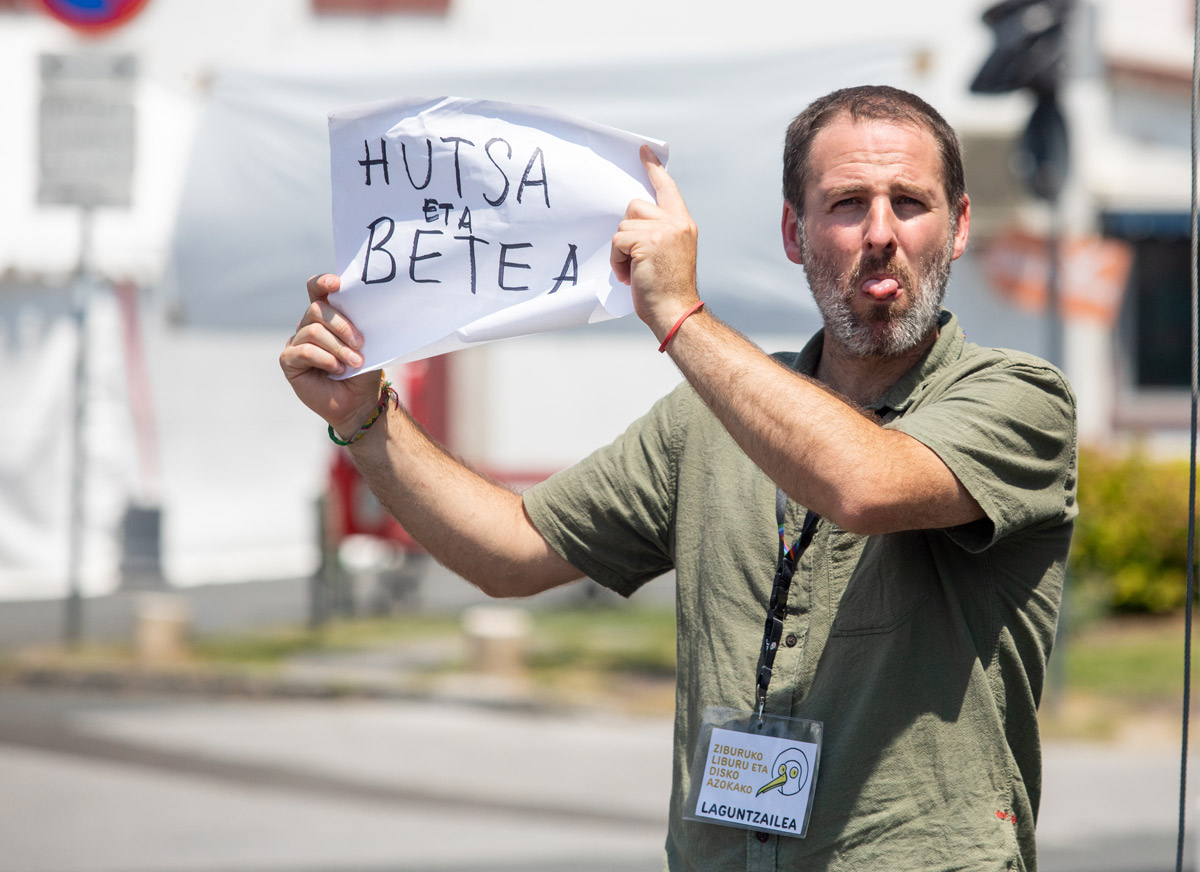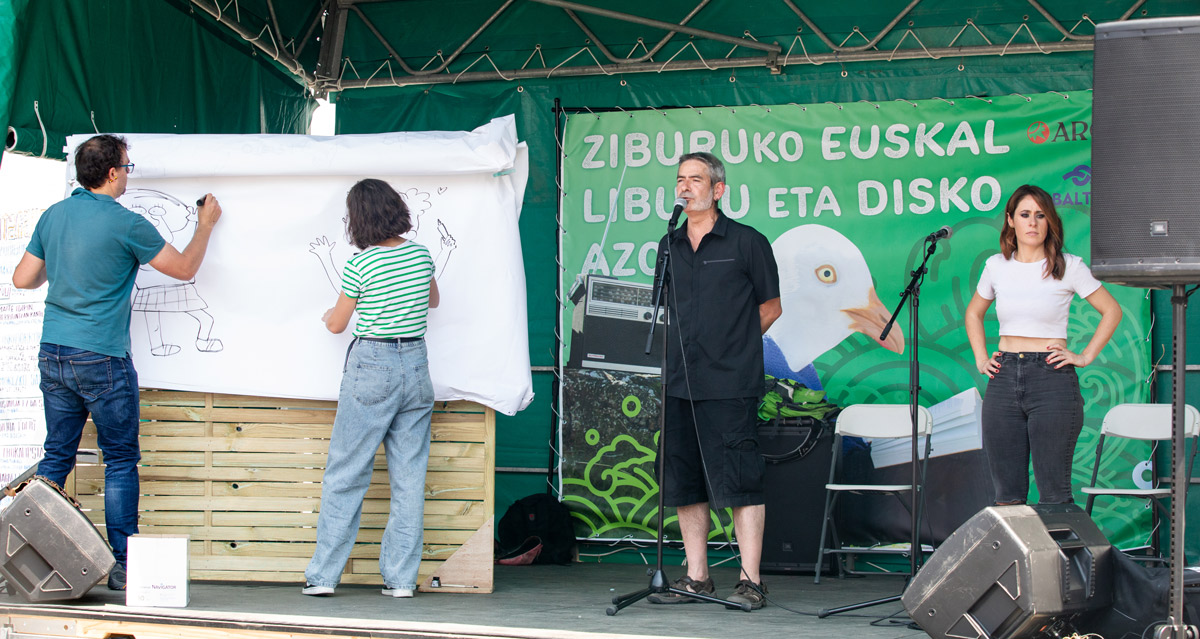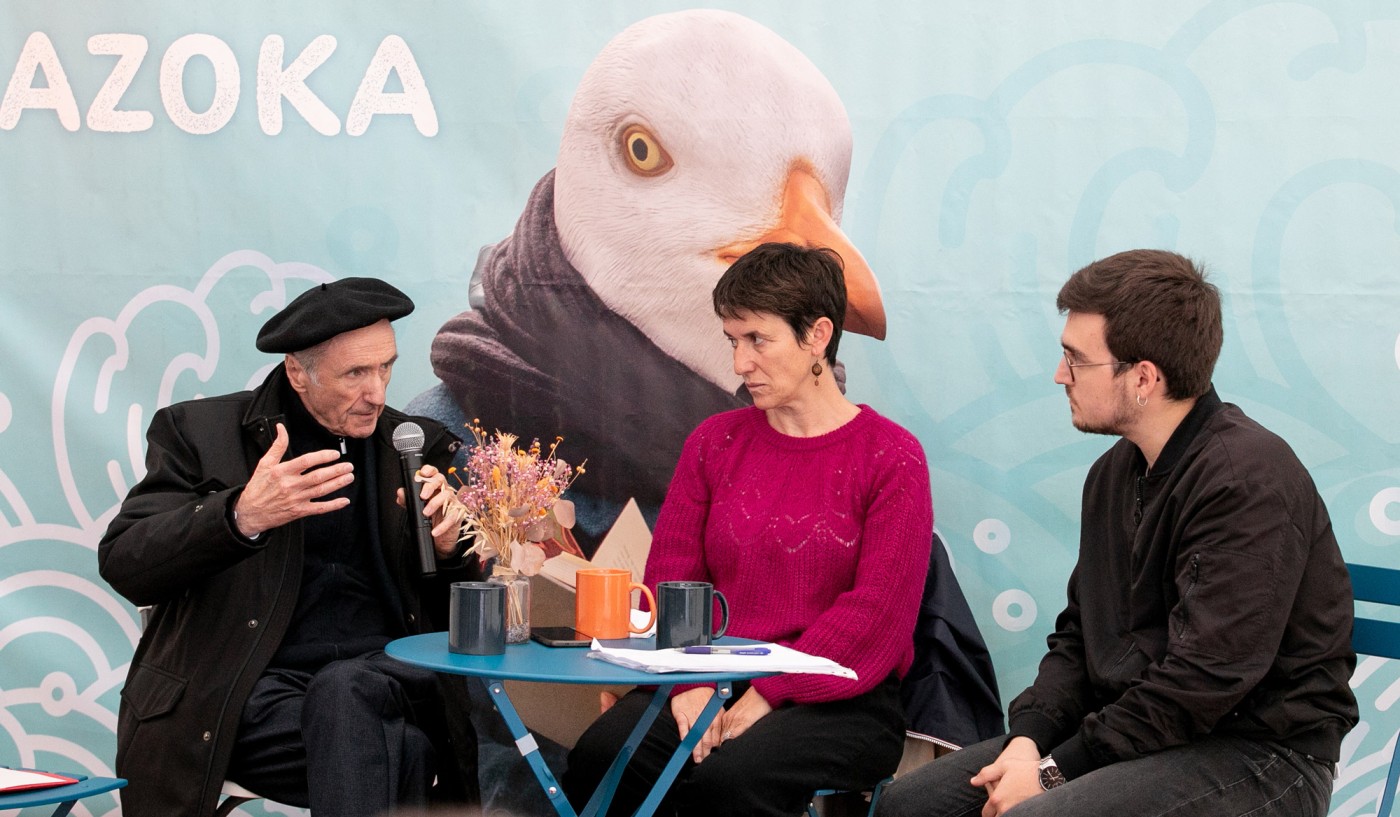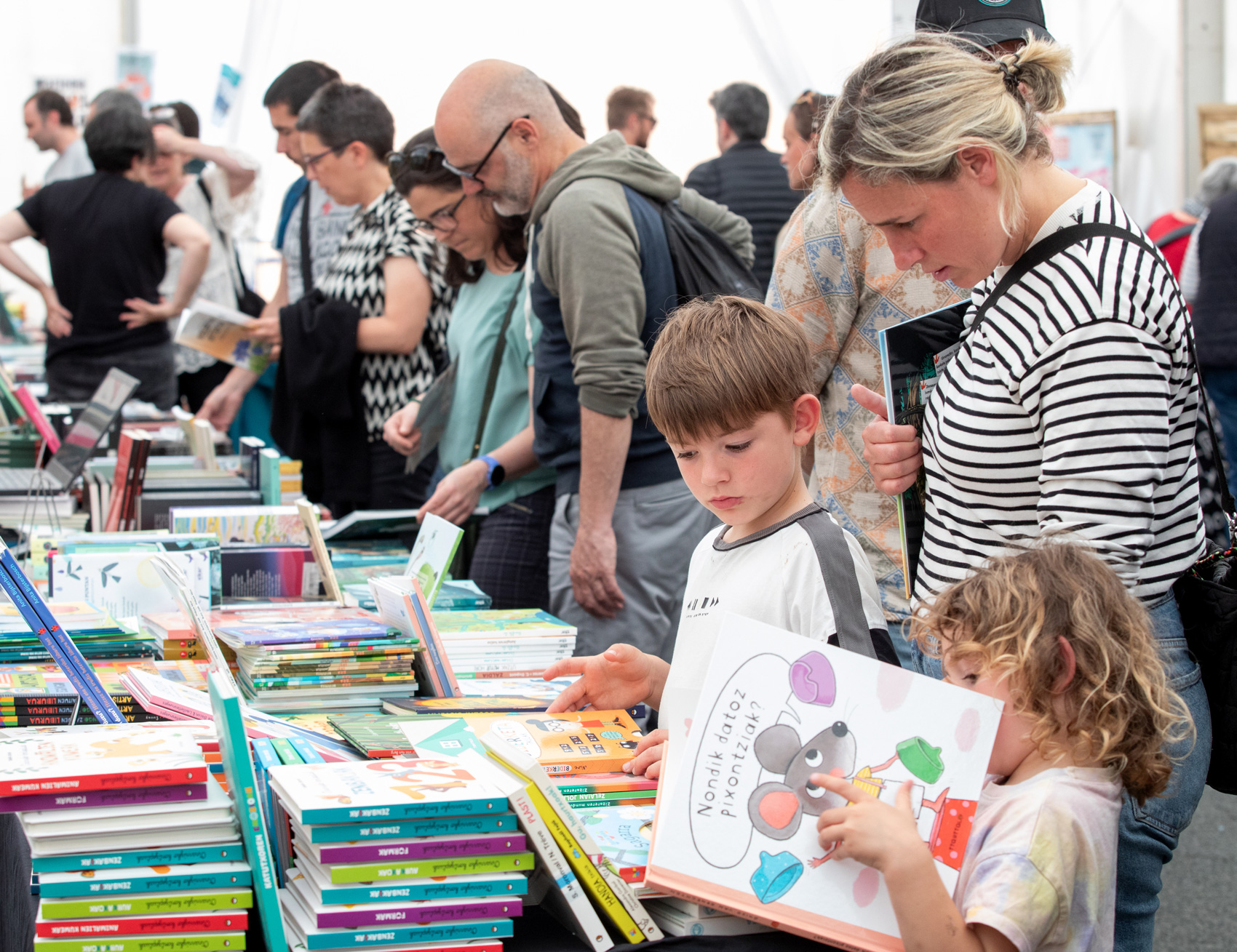There I meet my old friends...
- IV Libro y Disco Vasco de Ziburu. The fair was held on Saturday 3 June. It's been bigger than ever in number of meters, salespeople and visitors. Over time, the Basque festival has been celebrated in a festive atmosphere. This year, moreover, for the first time, it has been possible to enjoy live music and visit the exhibition of works of the young students of Ziburu.

Barely touched the sun, in the early hours of the fair was sweet under the tent, sheltered, fortified between books and records entirely in Basque. There were many stalls inside, where the mermaid was more than an excuse to protect herself from the sun. Of course, the moment of the crime ended when the tent itself got hot, and then you would eat. Salespeople and visitors had to survive like tomatoes and peppers from the greenhouse and smile at people, including someone before we were free to smile under the protection of kisses.
Bathing on the beach of Ziburu was a very pleasant and enjoyable action to escape from the heat under the tent, but closer, more affordable, the sea breeze reached very well at the side of the boards located in the atrium of the fair, to refresh itself in size. The improvised action of bertsolaris and cartoonists was the one that most liked. And with space, if you could under the shadow of the ... What a beautiful odor of bacon and talo, which penetrated through the holes of the nose to the bottom, to shake the calluses, how many would say. And although it wasn't heard aloud, friends working as volunteers between iron plates and cambals noticed that people were hungry. To help the stem, next door, you could ask for something in the txosna bar to cool your throat. Surely someone on the other side of the Bidasoa thought the glass of the Seaska ikastolas federation was too small for his thirst appetite. Not because there was little beer in, but because people had to cool their throat. Or by asking someone, I would answer both.

Meanwhile, in those square meters, more than one child was mute. They would certainly be tired because, in addition to the effect of heat, from the first hour of the morning, emotions surfaced a lot in the spectacular Makilakixki, the Old Source of Ziburu. The artists Maddi Zubeldia and Bernadette Luro gave their best and managed to put in the singing the youngest of the house who approached Ziburu with great merit. The youngest were in Firin-Fara, delighted; they could not fail to see some boys and girls who, surely, in the streets of Ziburu have not lived that kind of Basque sessions throughout the year.


So at noon, somehow the children were expected not to make too many cases to the figures of the bertsolaris that they created with Maurizia, the mayor of Pamplona, patriarchy and feminism. However, under the blurry, wide hat, the children watched carefully the drawings of Marrakatue and Aitor Brincherina, but we do not know if he noticed any similarity with the beautiful and intense rhymes of Maddalen Arzallus and Unai Iturriaga. Arguably, Adur Larrea showed the public in the words they spoke for the bertso, in the posters, not knowing what he was putting in, they would live the Bozoka program differently. But it does not matter: the verse and the drawing are married well, and helped by the calm and closeness the rapporteur conveyed, they offered a spectacular at the moments before the midday break. They formed an elegant plaza.


Conversation between books
In the kingdom of books and records, meanwhile, the members of ARGIA, who fulfilled the function of fan, were distributed at the entrance to the fair. “Protects independent journalism” or “protects from the sun before heatstroke.” But there was no drama or drama. People in posts of humor, and like time, people get warm. And hunger, hunger for books and records.
In the first edition sixteen publishers placed the point of sale; in the fourth edition have been 36
Two sympathetic and formidable wives of the Baltsan association who counted the visitors did not look at the territoriality, but also found that, like the perception of this journalist, those who were most hungry were those who live the most north of the Bidasoa. It was evident that the Fair of Ziburu is one of the few options in the region to access books in Basque. Another option is the Elkar store in Baiona, or the Mint café library in Ortzaiz, which is nothing more than fixed in the Basque Country which brings together three territories. In order to respond to this need, the Fair of Ziburu emerged, and for the fourth year the need for people has become apparent.

The other need that satisfies the fair, even for a day, is the meeting between editorials, body builders and creators, and even more so that of the people on both sides of the Bidasoa. Lucía Etxezaharreta said that on the morning round table it seems that the Bidasoa is expanding, that is, that we feel more distant and that it should not be so. Let it serve, therefore, to do so. And also to reflect on how to deal with the problem, to stay in the satisfaction of a breath day.
The number of visitors has increased year after year: It was about 700 in 2021 and 1,200 in 2023
In these kinds of fairs and gatherings, the human encounter of old friends experiences intense traffic. That is to say, in the story, ratios, the Fair of Ziburu is at a very high level of “how long you do not see”, “how do you handle it”, etc. (not even the EHZ festival lags behind, and in the Durango Fair, more in quantity, but it is too massive for tertulias to be long and serious). In other words, Ziburu has already become a stable date for the meetings of people from the cultural world. And Ziburu brings together people who think a lot and strong, so you can see and smell in the environment. Being anything minor, it's easier to see and you don't need randomness, because it's not one-time. The head of the books and records rises a little, looks towards the environment and confirms the belief that in that pair of tickets to the tent are chatting Koldo Izagirre, Joseba Sarrionandia and Pello Zubiria. And examples like this, a thousand.

These intersections also serve to undermine people. The Ziburu Trade Fair offers the possibility to face what has never been seen, by email, messages and phone calls, as well as to play with mime two kisses, hugs and arms to fire. These kinds of meetings also serve to be aware of others, to realize that I don't know who knows what it's going to do. These are predictions, at least predictions of intentions, the excuse to favor relationship and affinity.
Above all the capitalist and consumer perspective of the sale, the fair is also a meeting point, of course. The excuse to bind the two sides of the Bidasoa, to reduce the width of the Bidasoa, and to give a breath to those who have little breathing space.
Concrete actions are set out below:
"My friend Mark."

"The Baltsan Association asked me to advise me for a change of direction and I come here to give explanations." This is what started the mood session by the dramatic author Maryse Urruty in front of an audience who had a lot of work to keep the desk room. But in the end it got pretty laugh. And that is, with a very commercial view, with a passionate capitalist profile, Urruty argued that we have to take a look at culture in Basque. With humor, of course.
In essence, Urruty said that we need to create a Basque business. And how to do it step by step, he earned it so because the goal is to make best sellers. The first thing to do is to send the Basque writer abroad – Kirmen Uribe is a good example, also that of Joseba Sarrionandia, and obviously since he returns to Euskal Herria he has not published anything. Then choose the theme: traditional and historical themes are charming, but include romantic dramas by sex.
"Friends, open your mind." These were the recommendations of his friend Mark, Zuckerberg. In a humor program of just over a quarter of an hour, very demanding and with knives thrown one after the other, Urruty left the audience in laughter.
Comics Ño

The last ARGIA book has come out of the printing press and in just three days its first fair has come, and it has had in a handful quite sale, as the Basque reader likes the comic format. Furthermore, with Bertsolarism and feminism as a theme, one reads even more.
Eli Pagola and Maitane Gartziandia presented the book in the small tent to dozens of people and acquaintances. "Pagola stressed that they study power relations and gender impacts," while Gartziandia stressed that they are "issues requiring colorful shades."
(If you haven't yet, here's the chance)
Nostalgia doesn't sell the book

The second book by young writer Xan Idiart was published in the spring by the editorial Mayo and the editor himself, Luzien Etxezaharreta, has joined the talk.
From humor, from black humor, from irony. "Absurd stories," according to Idiarte, because they have no relationship between them. Through a series of characters, he interprets different profiles of the vague in the book.
In his book he uses Euskara batua, because he recovered Euskera at the age of 15, and therefore believes that he has remained unified.
What place does the theater have in a showcase like the book and the Basque fair of Ziburu? Or in other words, how much does the theater of literature have? This question was the starting point for Daniel Landart and Arantxa Hirioien at the round table Zubiburu of the opening... [+]
Berrogei argitaletxe eta diskoetxe, horietarik bederatzi berri, eta 120 salmahai bosgarren Ziburuko liburu eta disko azokan. Ekainaren lehenean ospatuko dute Baltsan elkarteak eta Argia hedabideak



















